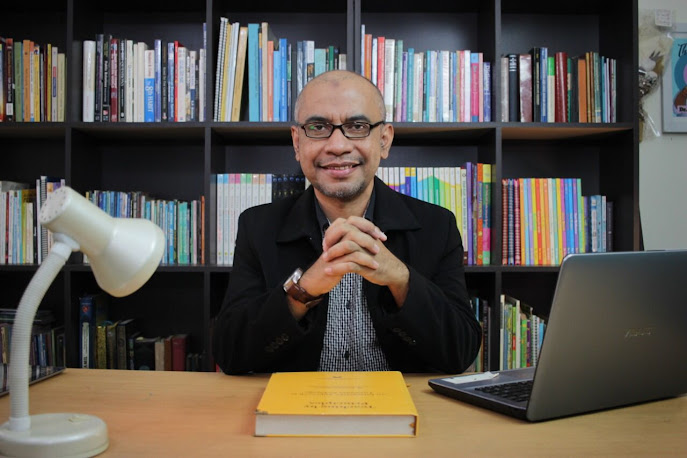(This article was first written for the Jakarta Post)
English is continuously developing as the most widely spoken language in the world, totaling about 1.7 billion speakers, including those who speak it as their first, second, and foreign language, native or non native English speakers. It is estimated that over 1, 5 billion people are currently learning English worldwide. A computer model developed by The English Company (UK) Ltd predicts that as of the year 2030 there will be over 2 billion people across the globe learn English for many reasons.
This figure is not a surprise as everyone knows that English has evolved to be a lingua franca bringing multiple privelages for its speakers. As Held (1999) declares ‘It is English that stands at the very centre of the global language system. It has become the lingua franca par excellence and continues to entrench this dominance in a selfreinforcing process. It has become the central language of communication in business, politics, administration, science and academia, as well as being the dominant language of globalised advertising and popular culture.’
Despite English teaching has been an important agenda within Indonesian education system, many studies show that the teaching of English in Indonesia is still far from success (Alwasilah, 2001; Lengkanawati, 2004). This can be seen in the field where there are still a large number of Indonesian students who are still unable to speak and use the language, despite the fact that they have been learning the language more than six years. Only few of them can speak English when they graduate from secondary schools or even from universities. What those students might know well were tenses, irregular verbs and other grammatical trivia.
Some interplay factors contributed to this ‘unhappy story’. Poor English teachers’ proficiency, lack of learning resources, and unconducive learning environment are among the factors which might contribute to this low achievement. This is not to mention other constraints, like limited time allotment, large class size, and the absence of non-communicative testing within our school evaluation system.
In regard to English teachers’’ proficiency, in her study about EFL teachers competence in the context of English curriculum in West Java, Lengkanawati (2005) showed low English proficiency among English teachers. It reveals only 28.95% of English teachers as her research participants who got above 500 TOEFL score.
The government has actually tried hard to formulate some policies to face this problem within last ten years. The government, for example, has launched a new curricula emphasizing the use of communicative approach to achieve certain set up competency standards (competency based curriculum). Also, the government has conducted a lot of trainings for English teachers. This is not yet to mention other endeavors, such as teachers certification, school accreditation, new teacher education program, and the provision of block grants for school improvement.
However, those efforts are not yet sufficient to improve our English proficiency as a nation. I think it is necessary now for us to have a new ‘revolutionary approach’ to overcome this problem.
I believe the country’s most perennial problems for English teaching lies in a very low exposure to this language. Sufficient exposure is a very important factor which would make the acquisition possible. Otherwise, the process of learning a new language would probably end up with little achievement.
Therefore, we need to reform language policy in Indonesia by making sure there is sufficient English exposure for English learners in Indonesia. Hence, it is worthy to review the Act No. 24 of 2009 about the "Flag, Language, and the coat of arms, as well as the national anthem", which obliges only the use of Bahasa Indonesia in public spaces, such as within the state speech, the language of instruction in national education, in the service of the administration, the official communications of government and private working environment. Even, the obligation to use Bahasa Indonesia in public facilities and public signs, as well as in the information conveyed via the mass media.
It is no longer debatable that Bahasa Indonesia is the national language, uniting the linguistically diverse nature of Indonesia into one national language. Nevertheless, our pride of being an Indonesian should not be the reason for us to reject the use of other languages in public spaces.
I am questioning some people who believe that a foreign language could endanger our national identity. There is no clear direct relation between the use of a foreign language, such as English, with the decline of the pride of being an Indonesia. Isn't it the great ancestors of our nation, like Agus Salim, M. Natsir, Tan Malaka and Sukarno were also very fluent in foreign languages? While at the same time they also became very nationalistic as Indonesians.
Again, a sufficient English usage in public spaces is very necessary to accelerate the proficiency of English learners in Indonesia, which in turn effectively provides the nature for the acquisition of English.
If we persist with such a situation, forcing only the use of Bahasa Indonesia in public spaces, it is very likely that in the long run we still have to pay dearly for the fact of low ability of our nation's foreign language, especially English. For example, the current global challenges compel us to translate the most important works from the English to Bahasa Indonesia, both for the purposes of education and others. We will be hard-pressed to get involved as a citizen of the world in many fields, such as civic, economic, trade, and international politics.
The writer is an Australia Development Scholarship alumnus, and currently doing his doctoral degree at TESOL International, Monash University in Australia.



4 comments
commentsThge widespread (but far from universal) use of English does indeed bring "multiple privileges for its speakers." I would add that mnative speakers of the language gain nparticuylar advantages. Should this be the case? I should like to see more widespread use of the planned international language Esperanto, which does not belong to amny one state or group of states. Do you agree?
ReplyHi Tom. Thanks for your comments.
ReplyThe idea of using such an international language (Esperanto) seems interesting in terms of its politically neutral language that transcends nationality and would foster peace and international understanding between people with different regional and/or national languages.
However, lets also think the cost we need to introduce and teach this language to millions of people across the globe. I believe that the challenge for Esperanto language teaching would be much harder than ELT, considering the Esperanto language users are far less English speakers. We need to train more teachers, teaching materials, curriculum, and other supporting means for the widespread of Esperanto. So, what do you think of its visibility and practicality issues?
Regarding the privileges gained by English native speakers, I think that it is no longer specific to the NT. As English has become an international language, everyone now, either NT or NNT could gain and equally get the same advantage from English. Everyone could make use of English for their own purpose.
This is evident in the field where English has developed to many kinds of 'world Englishes' with a lot varieties, like Indian English, Singapore English, and Chinese English, and other English varieties.
What do you think Tom?
Selamat siang Afianto. I am also a student at Monash Uni but am doing the Masters of Education (TESOL International). I came across your blog while researching an essay on NS teachers versus NNS teachers in Indonesian secondary schools. I tend to agree with your comments about the stringency of Law 24. Perhaps it is even a restriction on Indonesian citizens human rights, as commented on by some Indonesian academics. It seems to me that the Government's language policy is very out of step with the desires and aspirations of many Indonesians, particularly to learn English to potentially transform their lives and afford them a new cultural identity among the many identities they may already have.
ReplyPerhaps we might meet up on campus one day.
Sampai lagi. Paul Dartnell
Selamat siang Afianto. I am also an Education student at Monash University but am doing the Masters of Education (TESOL International). I came across your blog while researching an essay on NS teachers versus NNS teachers in Indonesian secondary schools. It seems to me that Law 24 is significantly out of step with widespread aspirations in Indonesian society to learn English and represents an overly cautious approach by the Indonesian Government to protect Indonesian national and individual identity without understanding that we all have many identity positions that are closely associated with the language or languages that we speak and the cultural meaning that we share through language. My other thought is that as some Indonesian academics have stated, Law 24 represents a constraint on Indonesians' human rights to use a different language to name their business, residence or the products they sell.
ReplyMaybe we will meet up on campus one day. I would be very interested to hear about your research.
Sampai lagi Paul